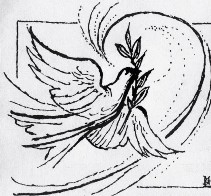![]()
![]()
Come Holy Spirit
Mary Hansbury
![]()
Vatican II theologians worked hard to produce new models and language for the sacramental life of the Church, less weighed down by abstract philosophical language. They turned to Syriac Christianity for a different approach: less philosophy and more Scripture; and acts of God’s presence mediated through the Holy Spirit moving through creation.
First from Sahdona 7th cent. (born in Iraq) on the heart as altar:
“So, provided the beginning of our prayer is watchful and eager, and with feeling of the heart we soak our cheeks in tears, and our whole time of prayer is performed in accordance with God’s will, then our prayer will be accepted in his presence, and the Lord will be pleased with us and find enjoyment in our offering, catching the sweet savor that wafts from the purity of our heart. And He will send the fire of his Spirit, which consumes our sacrifices and raises up our mind together with them in the flames heavenwards, where we shall behold the Lord
– to our delight, and not to our destruction, as the stillness of his revelation falls upon us and the hidden things of knowledge of him are portrayed within us, while spiritual joy is granted in our heart, along with hidden mysteries which I am unable to disclose in words to the simple. In this way we establish our body as a living, holy and acceptable sacrifice which is pleasing to God.”
What we have here is a dramatic internalization of the Eucharistic liturgy. Instead of the bread and wine offered up by the Church, the Bride of Christ, here it is prayer that is the offering, made this time by the individual soul, who is also the Bride of Christ. This offering is made on the altar, not of the Church, but of the heart, and since there is no human priest to utter the offering, God himself sends the ‘fire of his Spirit’, and raises the mind up to heaven as the fire receives and consumes the offering.
This parallelism between the transfiguring effect of ‘pure prayer’ in our heart, and the transformation of the bread and wine into the Body and Blood of Christ at the Eucharist, is a very important one. Syriac writers in the Syrian mystical tradition of the seventh and eighth centuries in fact use the same technical term for the activity of the Holy Spirit upon the heart when pure prayer takes place as that employed in the Eucharistic liturgy at the offering. The word means something like ‘overshadowing’. Significantly enough it is derived from the verb which the Syriac New Testament uses in the Annunciation narrative at Luke 1:35, ‘The Holy Spirit shall come upon you, and the power of the Most High shall overshadow you’. In our catastrophic times, this offers a model of personal prayer for our peace and it is world redeeming.
Spirit come transform us, be our Hope!
Deep in our heart, reveal Your presence O God!
Draw us to share the burdens of others, healing and loving with truth! You are the one who unites us in striving for justice and peace!
Another writer, Isaac the Syrian 7th cent. (born in Qatar) writes:
“What is a compassionate heart? The heart’s burning for all creation, for human beings, for birds and animals, and for demons, and everything there is. At the recollection of them and at the sight of them a person’s eyes gush forth with tears owing to the force of the compassion which constrains his heart, so that, as a result of its sense of mercy the heart shrinks and cannot bear to hear or see any harm or small suffering of anything in
creation. For this reason one offers up prayer with tears at all times, even for irrational animals, and for the enemies of truth, and for those who harm us, for their forgiveness. As a result of the immense compassion infused in the heart without measure – after the likeness of God – one even does this for reptiles.”
This prayer of Isaac is mandatory for the survival of the environment. And with a compassionate heart as described, it also includes our care for the environment: for our benefit but also because nature is not ours but God’s which He has entrusted to us. This ought to incentivize our care of the environment, it’s not optional.
Ephrem the Syrian (4th cent. Edessa; declared Doctor of the Church by Pope Benedict XV in 1920): says God reveals Himself through Scripture (the reading of it) and through Nature (our use of it) – so it is not ours to abuse.
Further readings: Sebastian Brock, Syriac Fathers on Prayer and the Spiritual Life, Cistercian Publications (Kalamazoo MI, 1987).
Dr. Mary Hansbury, a member of CPF and a Syriac Scholar, has translated several book & numerous articles
 R.McGovern
R.McGovern
![]()